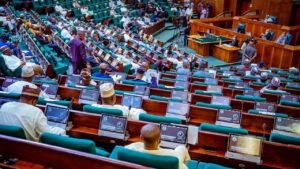
Politics: Aisha Buhari seeks support for women’s participation
Abimbola Abatta
Amid the race towards the 2023 presiden-tial elections, stakeholders have intensified advocacy for an increased participation of women in politics, considering that the issue of the role of women in politics in Nigeria has continued to generate debate.
As part of the efforts to advance her support for increased gender parity and women participation in politics, First Lady Aisha Buhari, on Wednesday, visited both Chambers of the National Assembly.
Buhari is the first serving first lady of Nigeria to witness the plenary seasons of both Senate and House of Representatives.
The First Lady, who was accompanied by her aides and other female Ministers, said she was there to observe proceedings on the laying of the report of the 1999 Constitution Review.
In her words, “I am here to witness the laying of a report on the amendment of 1999 constitution which provides a bill for an act to alter the provisions for the constitution to provide special seat for women in the National and state Houses of Assembly.
“It also provides for an act for affirmative action for women in political party administration.”
She lauded the efforts of both chambers in supporting women’s participation in politics, maintaining that she looked forward to witnessing progress on the bill.
Meanwhile, a Non Governmental Organisation, Abiodun Essiet Initiative for Girls (AEIG), has called on new area councils in the Federal Capital Territory (FCT) to reserve 35 per cent of their appointments to women.
The Executive Director of the organisation, Mrs Abiodun Essiet, made the appeal while briefing newsmen on activities of the organisation, on Thursday, in Abuja.
According to her, women deserved to drive the area councils’ administration agenda in order to deliver good governance to the people, especially those at the grassroots.
“Though we have our core mandate as an organisation, which is helping girls and women thrive in the society, and to promote their sexual and socio-economic well-being.
“But as a member of the civil society, we can’t shy away from our responsibility to bring to fore issues affecting the masses or group of people, hence the need to raise some of these issues,” she said.
Essiet said that for the sake of gender equity and social inclusion, the chairmen should consider reserving at least 35 per cent of their appointments for women.
She maintained that the organisation would continue to advocate for political appointments for the original inhabitants of the FCT, as they could only fight their causes when they were at the helm of affairs of government.
In another development, the Federal Government, as disclosed by the Minister of State for Budget and National Planning, Mr Clem Agba, is working on attaining a gender-inclusive budget.
The Minister made this known in a joint Press statement of Government/EU/UN Spotlight Initiative issued on Thursday in Yola.
In his words, “The Federal Government is continuously working on attaining a gender responsive budget and gender inclusiveness in government plans and actions including in public appointments.
“We must also work on strengthening coordination mechanisms across the 36 states and across the major thematic areas because it is this effective coordination that will support sustainable results.
“I would like to acknowledge the contributions of the EU /UN joint Spotlight Initiative in fostering transformative change and instituting meaningful milestones around elimination of violence against women and girls.”
On her part, Minister of Women Affairs and Youths Development, Mrs Pauline Tallen, said the ministry was aware of the vulnerability of Nigerian women.
Tallen said the increasing reports of Gender Based Violence cases are a testimony to this.
She said, “On our part, we are working passionately to address the issues and we are doing this from all angles.
“Our goal is to put in place the necessary legal frameworks and policies that protect women and girls, and raise awareness on negative social norms.
“Our aim is to create a Nigeria that is safe for every woman and every girl.
“Some of the big milestones of the Ministry of Women Affairs in the last few months is the establishment of a GBV Data situation room in the 36 states of Nigeria.”
She said the situation room was a digital tool that supports State Ministries of Women Affairs to collect and transmit real-time data that will facilitates timely response.
The Minister said the GBV situation room is a model for data collection in Nigeria and beyond, noting that access to justice for survivors was one area that should be collectively pay close attention to.
“I would like to advocate for the establishment of a Special Court that will summarily prosecute offenders without delay.
“I will also ask that the state standardises its temporary shelter for women victims of abuse or build one if this does not exist.
“On my own part, I want to commit the Ministry of Women Affairs to lead on this change that we are seeking for women,” she said.
Similarly, European Union Ambassador and Head of EU Delegation in Nigeria, Samuela Isopi, said the Spotlight Initiative was a global multi-year partnership between the EU, UN and participating national governments.
Isopi explained that, “In Nigeria, the initiative has been working to build a momentum that drives attention to the scale of the problem as well as to catalyse sustainable actions that can addresses significant bottlenecks.
“I want to congratulate the team here in Adamawa for the successful implementation of the Spotlight programme so far.
“I note several key achievements like the passage of the VAPP act by the State House of Assembly and its subsequent assent into law by the Adamawa state Governor,” Isopi said.
Also speaking, UN Humanitarian and Resident Coordinator in Nigeria, Matthias Schmale, said that it was clear that the Spotlight Initiative was both traditional and at the same time innovative.
“It is traditional because it aims at addressing basic issues such as strengthening of GBV systems and services.
“This includes activities that raise awareness and enhancing access to justice for GBV survivors.”



